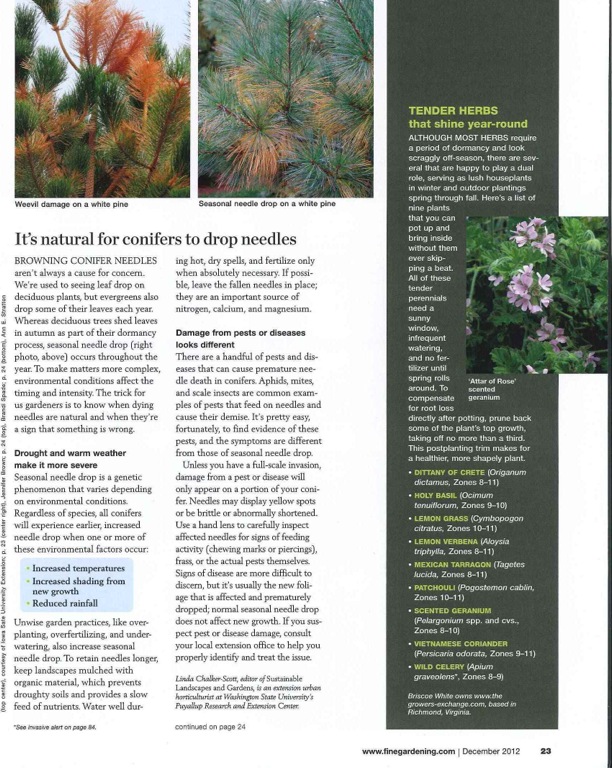I am published in Fine Gardening magazine…
It all started with questions I was getting from customers about growing outdoor herbs in the winter. Because we strive to provide an exchange of information for all types of growers, I was more than happy to help. Fine Gardening was getting the same questions from their readers that we were getting from our customers, so they picked up my article and used it in their December 2012 edition to help reach more growers who were having the same questions.
A Strategy for Maintaining Fresh Herbs in Winter
Here are a few tips to help you winter over your favorite herbs:
3 reasons to bring your herbs indoors:
- Keep the herbs alive to get more months of enjoyment
- Enjoy fresh flavor for all of your hearty winter dishes.
- To keep tender plants over-winter for spring planting
When to bring herbs indoors: Two weeks before the first hard frost, typically mid-Sept to mid-October
How to repot:
- Choose the healthiest plants and compost the others.
- Clean soil of debris and weeds
- Dig plants carefully, saving a generous root ball.
- Repot into containers 2” wider and deeper than the root ball using fresh potting soil
- Thoroughly water newly potted plants
- Leave plants outside for a few days to acclimate to their new containers.
Indoor Care Tips:
- Choose a sunny location with 6-8 hours of direct sun.
- Consider temperature and humidity. Don’t place them where they will dry out quickly or be in a cold, drafty spot.
- Typically herbs don’t need a lot of water. Check soil by sticking your finger about a half inch in to test for moisture.
- Room temp should not go below 50 degrees
- Let the plants rest before harvesting
- Don’t be alarmed if your herb plants lose their lower leaves as this is the plant’s way of dealing with the change and getting rid of leaves that no longer produce enough food. Lemon Verbena is especially likely to do this.
Which herbs will work best indoors?
- Tender perennials: Bay, Lemon Verbena, Lemon Grass
- Biennial herbs: parsley
- Annual herbs: cilantro, arugula,
Dormancy requirements make some plants better choices.
- Unless you want to add grow lights, avoid plants that go dormant like mint
- Hardy perennials are best left outdoors. Rosemary, Lavender, Mint
6 plants to keep for winter then return to garden in spring:
6 plants that are used for extended harvest.
Replanting your herbs for Spring:
After the last frost, usually late April or early May, start placing potted herbs outside during the day so they get accustomed to a new climate. Keep an eye on night temperatures. Begin to leave them out when night temperatures are above 50F.
- Plants should have been pruned in winter. Trim stray stems to keep plants bushy
- Replant in mid-May



Excellent tips! And in Fine Gardening! I guess that makes you the herb expert!!!